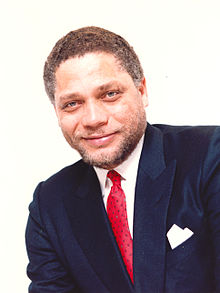Mickey Leland
| George Thomas Leland | |
|---|---|
 |
|
| Member of the U.S. House of Representatives from Texas's 18th district |
|
|
In office January 3, 1979 – August 7, 1989 |
|
| Preceded by | Barbara Jordan |
| Succeeded by | Craig Washington |
| Member of the Texas House of Representatives from District 88 | |
|
In office 1973–1979 |
|
| Personal details | |
| Born |
November 27, 1944 Lubbock, Texas, United States |
| Died | August 7, 1989 (aged 44) Gambela, Ethiopia |
| Resting place |
Golden Gate Cemetery Houston, Texas |
| Political party | Democratic |
| Spouse(s) | Alison Clark Walton-Leland (m. 1983–1989, his death) |
| Children | 3 sons |
| Alma mater | Texas Southern University |
| Profession | Politician |
| Religion | Roman Catholicism |
Golden Gate Cemetery
George Thomas "Mickey" Leland (November 27, 1944 – August 7, 1989) was an anti-poverty activist who later became a congressman from the Texas 18th District and chair of the Congressional Black Caucus. He was a Democrat.
Leland was born in Lubbock, Texas to the parents of Alice and George Thomas Leland, II. At a very early age, the Lelands moved to Houston's Fifth Ward neighborhood.
Growing up in a predominantly African American and Hispanic neighborhood, Leland attended Wheatley High School in Houston, Texas, where he ranked in the top ten percent of his class when he graduated from Wheatley in 1964. While attending Texas Southern University in the late 1960s, he emerged as a vocal leader of the Houston-area civil rights movement and had brought national leaders of the movement to Houston. Leland graduated from Texas Southern in 1970 with a Bachelor's degree in Pharmacy. He served as an Instructor of Clinical Pharmacy at his alma mater from 1970–71, where he set up "door-to-door" outreach campaigns in low-income neighborhoods to inform people about their medical care options and performing preliminary screenings.
It was during the administration of then-Texas Southern University President Leonard O. Spearman, where Leland received an honorary doctorate degree from his alma mater.
In 1972, Texas for the first time allowed its State House of Representatives and Senate seats to be elected as single-member districts. Soon after the decision, five minority candidates (dubbed the "People's Five"), including eventual winners Leland, Craig Washington and Benny Reyes ran for district seats in the Texas House of Representatives, a first for a state that, although Barbara Jordan had been a state senator, had not seen any African-American state representatives since Reconstruction.
...
Wikipedia
